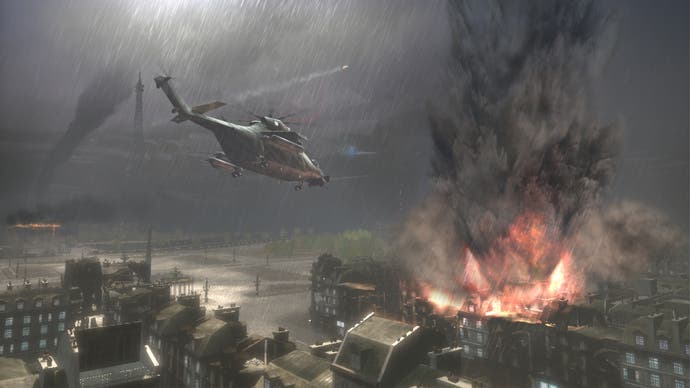Tom Clancy's EndWar
Go left. Gooooo left. LEFT. I SAID LEFT. (So, none of that.)
Sketching out a typical scenario (invading Paris seems appropriate), de Plater explains that you might start by deploying light infantry, pushing them forward and garrisoning them inside some buildings for concealment, before bringing engineers up to lay mines. You'd then pull them out, set your artillery up, scout with your helicopters, and try and draw your enemy down into that hidden deathtrap, where you can ambush them on all fronts - blowing lumps out of their tanks with artillery and mines and then roaring in on foot if necessary. What's more, when you capture certain areas of the map you're able to call in off-map support - airstrikes, EMP blasts, satellite intelligence - to aid you in your fight. The environment will also have an impact on tactics, with much of it destructible. So then, the loss of resource- and micro-management hasn't dumbed the game down, at least in de Plater's view. "There's more than enough tactical and strategic challenge in this chess-game of moving your units to beat your enemy on this very dynamic and realistic battlefield," he insists.

Things seem to be kept fairly concise, unit-wise, offering plenty of strategic depth without overwhelming the player with options. There are seven types of squad - the riflemen act as snipers, heavy infantry lay mines and tank traps, and have anti-tank weapons, transports boast anti-aircraft rockets in some cases, and then you have artillery, helicopter gunships, light infantry and command vehicles for intelligence-gathering. There'll be some futuristic weapons, too, like a microwave gun that fries you under your skin, and the "Rods from God" that you might have spotted at the end of the CG attract-sequence shown during UbiDays' press conference: tungsten rods fired from space, which devastate huge areas, fallout-free. The Tom Clancy link also means you'll take control of some familiar units - the Ghosts and Team Rainbow, for instance. And de Plater says that with the potential for "1000 units" on the battlefield at any given time, it will scale up pretty menacingly as things develop. He also believes that the fact it does should help distinguish it from PC title World In Conflict, developed by Massive, which otherwise seems immediately comparable.
All in all it's piqued our interest, and with developers from the likes of Total War (de Plater's a veteran) and Command & Conquer on board, the potential for a "persistent World War" over the Internet (they cited EVE Online in comparison), and a public beta-test set for November, the game's creative director hopes the anticipation ramp-up will be as sharp as the biggest claim he pokes us with during our time at UbiDays: that the team wants to do for console strategy what Knights Of The Old Republic did for console RPGs. The game's up and running at the studio in Shanghai, so hopefully we'll be able to pop over soon and tell you whether it's any good, and whether de Plater's claim that Shanghai is like "living in Blade Runner" is accurate.

